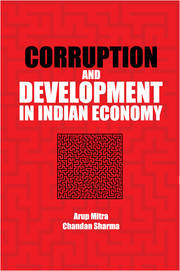Book contents
- Frontmatter
- Contents
- List of Tables and Figures
- Preface
- 1 Issues in Corruption: Theoretical and Empirical
- 2 Corruption in India: A Comparison with the Rest of the World
- 3 Estimation of Personal Income Tax Evasion in India: Evidence from Household Survey
- 4 Effects of Corruption on Firms' Performance: Evidence from Firm Level Data
- 5 Determinants of Bribery in Indian Firms: Who Must Pay Bribes?
- 6 Labour Market Flexibility and Corruption: Issues Related to Labour Contractualization and Business Subcontracting
- 7 Corruption in Innovation: Effect of Innovation on Performance
- References
- Index
3 - Estimation of Personal Income Tax Evasion in India: Evidence from Household Survey
Published online by Cambridge University Press: 23 July 2017
- Frontmatter
- Contents
- List of Tables and Figures
- Preface
- 1 Issues in Corruption: Theoretical and Empirical
- 2 Corruption in India: A Comparison with the Rest of the World
- 3 Estimation of Personal Income Tax Evasion in India: Evidence from Household Survey
- 4 Effects of Corruption on Firms' Performance: Evidence from Firm Level Data
- 5 Determinants of Bribery in Indian Firms: Who Must Pay Bribes?
- 6 Labour Market Flexibility and Corruption: Issues Related to Labour Contractualization and Business Subcontracting
- 7 Corruption in Innovation: Effect of Innovation on Performance
- References
- Index
Summary
Introduction
The estimation of personal income tax evasion is vital and relevant as it alters the competitiveness of the market, introduces inequities among equals and modifies the outcomes of public policies. Although measuring tax evasion is a challenging and formidable task, as Schneider and Enste (2000) describe, tax evasion measurement is ‘a scientific passion for knowing the unknown’. It is widely argued that a better understanding of tax evasion is necessary for designing suitable tax policies in the country which has direct implications for employment generation, economic growth and welfare (see for example, Disney, 2000). The issue has become somewhat more relevant in present circumstances, when most of the countries including India are facing unsustainable high fiscal deficit.
The approach for estimating tax evasion based on the availability of data can be grouped into two broad categories: the macro and micro approaches. The macro-level studies mainly focus on the shadow economy or underground economy (for example, Tanzi, 1983; Schneider and Enste, 2000 and Schneider, [2005] 2007), while the micro level analyses use micro-level data, i.e., household survey and institutional data. This route is also well traversed in the standard literature (for example, Pissarides and Weber, 1989; Merz and Wolff, 1993; Fiorio and D'Amuri, 2005; Marino and Zizza, 2010; Hurst et al., 2011). However, most of the micro-level studies focused on the developed countries and in the case of developing countries the issue has not been widely followed (though some of the interesting studies, as mentioned in chapter 1, are noteworthy). This is mainly due to non-availability of micro level data or the available data is not suitable for the purpose. Nevertheless, the micro level studies are considered to provide better estimates (Pissarides and Weber, 1989).
In this study, an attempt is made to provide an estimate of the personal income tax evasion by utilizing a rich microeconomic dataset that is representative of India's population. Our approach in this study is somewhat different from the previous micro level studies as we attempt to follow a direct route and project income and tax liability of individuals in India.
- Type
- Chapter
- Information
- Corruption and Development in Indian Economy , pp. 39 - 61Publisher: Cambridge University PressPrint publication year: 2016



